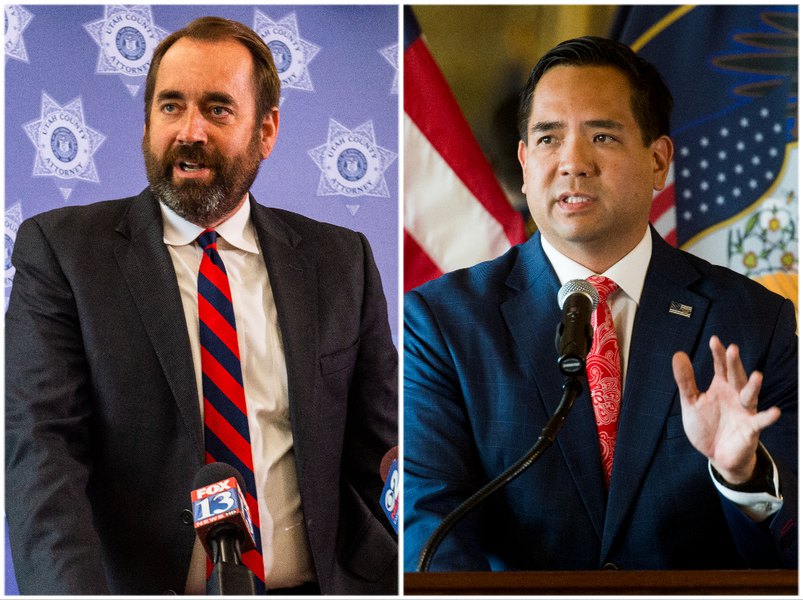
Rival attorney general candidates David Leavitt (left) and Sean Reyes (right) both oppose protesters’ demands to defund police departments.
SALT LAKE CITY – Rival attorney general candidates Sean Reyes and David Leavitt don’t agree about much.
But they do agree that defunding police forces is not the way the way to implement nationwide law enforcement reform.
“I think it’s a huge mistake,” said Utah County Attorney David Leavitt, referring to the nationwide calls by Black Lives Matter protesters to defund metropolitan police departments. “We should be demilitarizing our police, to be sure. But we should not be defunding police departments.”
“Let me say categorically that I think dismantling police departments is irresponsible,” Utah Attorney General Sean Reyes emphasized recently. “It’s wrong-minded and it’s myopic.”
Such views are not popular with Salt Lake City activists. While Leavitt and Reyes have been trading barbs over dubious donations and criminal justice reform on the campaign trail, the Utah Attorney General’s Office has been the target of demonstrations over the death of Bernardo Palacios-Carbajal, who was shot and killed by police on May 23 during an alleged armed robbery attempt. The most recent of those demonstrations involved about 200 protesters on June 24.
But Leavitt and Reyes are taking the controversial position that the very real issue of racial bias in law enforcement must be separated from the ongoing effort to reform police procedures and departments.
“I feel very acutely the pain of people who feel discriminated against, who feel marginalized, (have been) made to feel, as I have sometimes, less than human,” said Reyes, whose multi-racial background includes a mixture of Filipino, Spanish, Hawaiian and Japanese ancestry.
Leavitt said that he’s been gathering data in Utah County for a year that has convinced him that Utah has a “huge problem” with racial bias in its criminal justice system.
Reyes agreed that his office has a moral obligation “to ensure people … are treated equally regardless of their skin color, religion and sexual orientation … In the justice system, we have to be truly blind that way.”
But the attorney general dismissed the idea of a valid connection between protecting minority rights and defunding police forces.
While Reyes acknowledged that the introduction of more mental health professionals into law enforcement might be justified, he said they could never entirely replace police officers.
“(Social workers) may be great for responding to a situation with an addict,” he has emphasized. “But if that addict has a weapon and is violent, you need trained law enforcement.”
Rather than dismantling law enforcement, Leavitt said prosecutors and attorneys general have to step up to their necessary role of providing checks and balances on police when they are accused of misconduct.
Police forces nationwide are already struggling with funding for training and resources, Reyes has argued. He believes that what is needed to ensure more enlightened community policing is more funding not just for police, but also more funding for the neighborhoods to provide social programs, after-school programs, community involvement programs, education programs, sports programs.
But funding alone won’t bring about the needed changes in law enforcement, Leavitt cautioned. He believes change won’t come without changing the hearts and minds of those in the system.
“There’s not a single human on the planet who doesn’t have a sort of implicit bias against another group of people who are different than they are …” Leavitt has noted. “The way to fix this problem is to fix us, to change us.”

